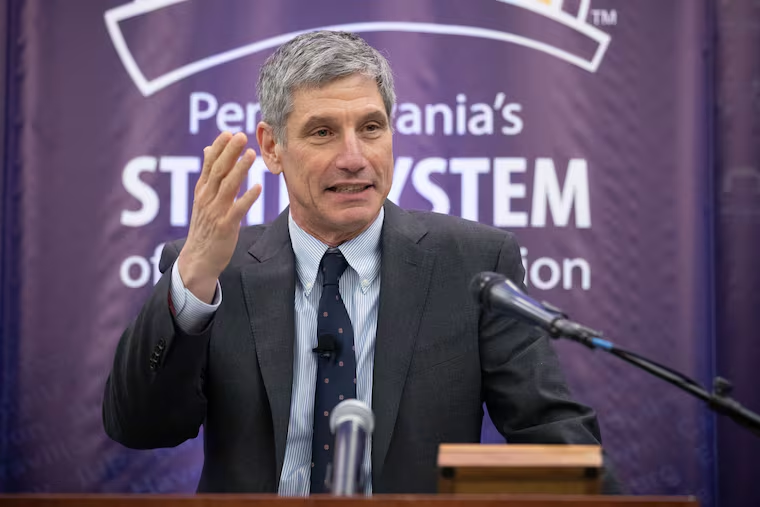Reopening of Pennsylvania state universities will vary by campus
During an hour-long discussion, they expressed concern about liability, availability of testing and costs associated with enhanced cleaning and safety measures, as they grappled with many of the same issues colleges throughout the region are facing as they plan for the fall.

Pennsylvania’s 14 state universities are planning to reopen in the fall, but that reopening will vary by campus, the system’s chancellor said Wednesday.
The Pennsylvania State System of Higher Education’s Board of Governors approved a general framework for reopening the 96,000-student system, giving individual presidents authority to work on details for their campuses, which are spread throughout the state, from cities to rural areas.
During an hour-long discussion, they expressed concern about liability, availability of testing, and costs associated with enhanced cleaning and safety measures as they grappled with many of the same issues colleges throughout the region are facing as they plan for the fall.
» READ MORE: Colleges’ fall plans: Online classes? Hybrid? Early end to the semester? Options abound.
Some schools may invite only a limited number of students back to campus for face-to-face instruction, said Daniel Greenstein, the system’s chancellor. Some are looking at allowing single-occupancy dorm rooms, while others are planning to offer suite apartments where those in a unit would act like a family. The colleges are exploring various course schedules and hybrid models of face-to-face and remote instruction, he said. They’re also varying the semester calendar, with some planning to start and finish earlier, he said.
“Our universities are very different,” he said. “And the plans being developed will reflect very different local circumstances.”
» READ MORE: Pennsylvania state universities freeze tuition, plan for uncertain fall
But all the plans, he said, will include contingency steps to move quickly to remote instruction if the coronavirus pandemic resurges. And the system will be guided by state guidelines, which specify how campuses should operate during the “red,” “yellow,” and “green” phases of Gov. Tom Wolf’s three-phase reopening plan.
Board member Janet Yeomans asked what liability colleges will face if they bring students back and an outbreak occurs, resulting in deaths and financial losses.
“What kind of protection do we have, do we need to have against that?” she asked.
Andrew Lehman, the system’s counsel, said that as a public entity, the system has sovereign immunity protection.
“There are not liabilities in which the legal office is unduly alarmed,” he said.
Board Chair Cynthia Shapira said the system is making its best effort to develop sound plans, and that the board needs to demonstrate accountability by endorsing that effort.
“There’s still risk, and that’s just the nature of what it is,” she said.
State Rep. Brad Roae (R.-Crawford/Erie) noted that the legislature voted this week to repeal Pennsylvania’s state of emergency, though it’s unclear what that vote actually changed and Wolf has said his order remains in effect. Roae encouraged colleges to reopen to the greatest extent possible.
» READ MORE: Colleges had to adapt to virtual final exams. What they learned could shape the future on campuses.
“If we don’t go back to having a nearly normal, well-rounded, in-person interactive education, we’re going to lose a lot of students," he said. "Students want real college. They don’t want college through a computer screen.”
But Meg Snead, Wolf’s policy and planning secretary and board designee, cautioned that the administration does not believe the legislature has the power to remove the disaster declaration.
“I’m sure this will be litigated,” she said.
Greenstein said chief to the colleges’ planning process is the knowledge that many students in the system would benefit from in-person instruction. During the spring, some students struggled with internet access in their local communities.
“Many of the students that we engage don’t do desperately well in remote learning.” he said. “They need the kind of engagement that our universities provide.”
But Jamie Martin, president of the statewide faculty union and a professor at Indiana University of Pennsylvania, cautioned system leaders to proceed carefully.
“We all want to be back in the classrooms interacting with our students, but we recognize that the fall 2020 semester is but one semester in many others that will follow,” she said.
Martin noted that some staff are at high risk from the virus.
“We have to have some plan in place for those individuals because we are going to be in close contact with the students,” she said.
State Sen. Judith L. Schwank (D., Berks) asked if campuses would have access to coronavirus testing.
The system has to rely on the state for assistance with testing and contact tracing, Greenstein said. “The absence of the surveillance techniques is a considerable challenge."